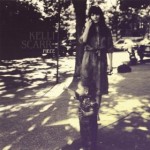Kelli Scarr, Piece

I screwed up Kelli Scarr’s CD, and honestly, now I’m kind of glad I did. Not the actual CD, mind you, but the copy of Piece that I’m currently listening to — apparently I managed to mix up the track order pretty severely when I burned the disc so I could listen to it in the car, and the error didn’t occur to me ’til I happened to look at the track listing on the label Website and realized that, “hey, the title of that song sure sounds like this other song I was just listening to…”
Again, though, I’m glad for the mistake, because I think if I hadn’t heard “Brother” as the first track on the album, I might not’ve had the patience to wait through “real” opening track “Salt to the Sea.” The latter’s not bad, mind you — it’s a decent, drifting/wavering slice of folk-pop with a vaguely tropical feel and slightly country-tinged, round-sounding vocals — but it can’t compare to the stark, bleak beauty of the former, with its melding of delicate, barely-strummed guitar and minimal, way-in-the-background piano and the Cat Power-/Jolie Holland-esque country girl vocals.
It’s a beautiful, haunting late-night song, the sound of a woman bent over a guitar and singing in what’s almost an earnest whisper into a mic, quiet so nobody else in the house can hear her pouring out her pain and regret to a brother she probably isn’t going to ever see again. It pulls you in nicely, taking you right to that dimly-lit, bare-walled room and sitting you down on the floor right next to her.
The track also helpfully sets the tone for a lot of the album, which remains sweet and melancholy and somewhat close to the Chan Marshall/Holland vocals throughout (although there’s less of the half-mumbled weirdness of those two singers, much as I love ’em, and more flat-out confidence). Scarr’s musical style varies from track to track, but with “Brother” planted firmly in my mind from the start, I found it all held together a lot better than when I tried listening to the album in the correct order.
Of course, it helps that “Driftwood,” the second track, is utterly badass on its own, starting off with nothing but a tinny, jangly guitar and voice but quickly revving up into a full-fledged Phil Spector number, complete with bomp-bomp rhythms, cascading melody lines, and whoa-oh backing vocals. The whole things roars along ’til the end, all ’60s heartbreak and sass, and then, in the face of all expectations, crumbles back down to just a tinkly barroom piano playing alone. Scarr hits the Motown-ish stuff again on “Pure Gold,” albeit in a slower, more languid way; the track could almost be an Amy Winehouse song at points…if, er, Winehouse were from the outskirts of Nashville and could remain sober for more than a half-hour at a time.
Scarr’s best moments come mostly when she keeps things subdued, however. Beyond “Brother,” there’s also the deliberate, sweet “Break Up,” “Anything,” which uses all of one piano chord (I think?), a la Downpilot’s “True,” to anchor her gorgeous, lush, Azure Ray-sounding vocals and keep-it-quiet feel, and “The Wonder,” which is gentle and beautiful, with beautifully shimmering layers of Mojave 3-like sound weaving in and out beneath Scarr’s angelic-yet-rough voice. And then, right at the end (of the actual CD track listing), there’s “Come Back to Me,” the most overtly “country” song on here and one that sighs and drifts like the wind across the open prairie, coming off nicely like Lucinda Jackson. At moments like those, she’s able to evoke something both warm and lonely at once, cozy and isolated from the world outside.
The one track on Piece that really throws me, by the way, is “Baby Boom,” which seemingly scraps the whole country-folky jangle-pop motif in favor of a more glacial-sounding thing with a shiny-sweet electro sheen and crystalline, almost brittle vocals that sound less like Chan Marshall than they do Kate Bush…and yet, it still works amazingly well. And then I see that before striking out on her own, she toured as part of Moby’s band, of all things, singing and playing keyboards on some of his tracks, and the whole Goldfrapp shift makes sense.
It kind of has me wondering, though, if Scarr specifically chooses to sing and play the way she does on Piece, even though she can do all this other stuff over on the outside of her current “sound”; she can definitely do the melancholy folk-pop thing, and yet she’s capable of something totally different, too? I’m now extremely curious to see where she goes from here, whichever direction it happens to be.



Leave a Reply